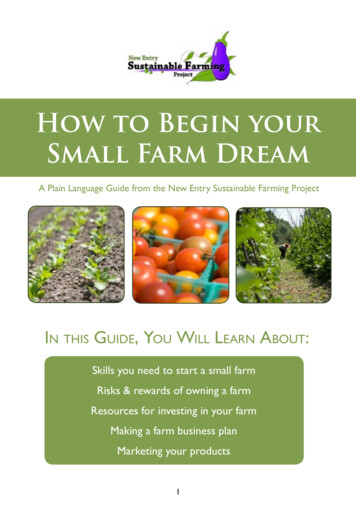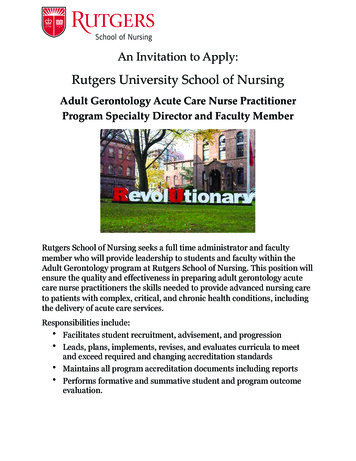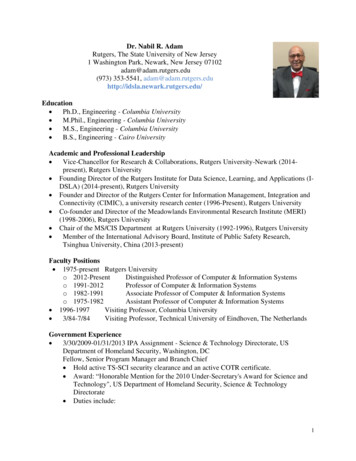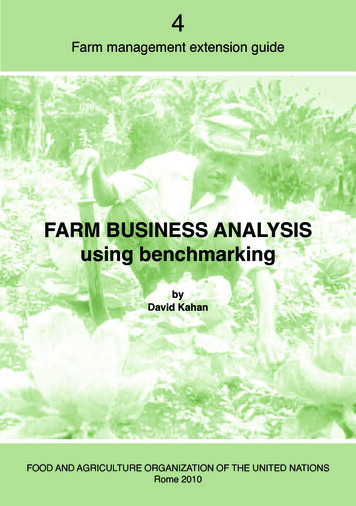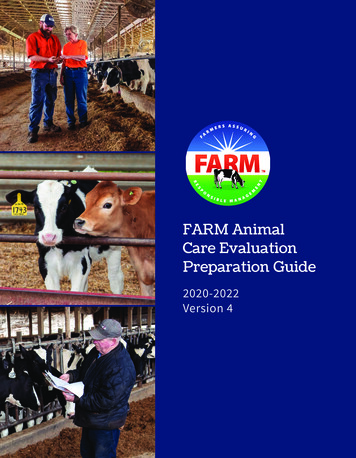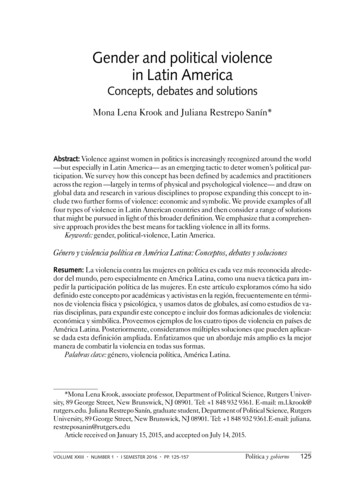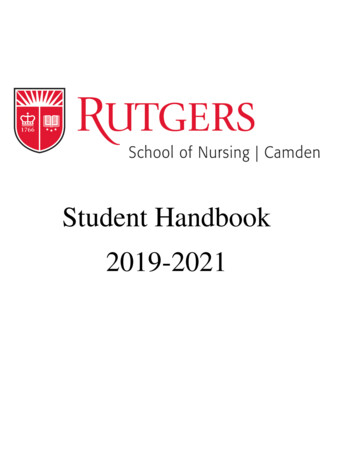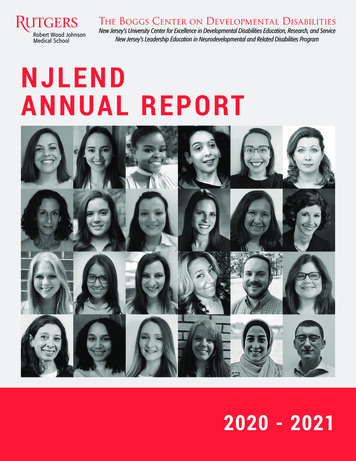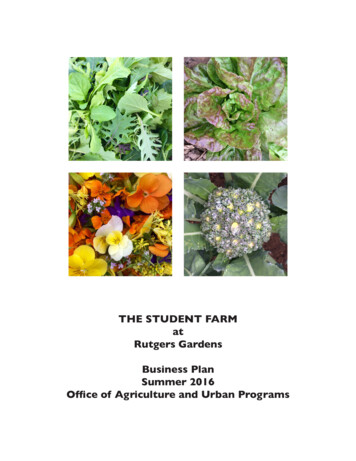
Transcription
THE STUDENT FARMatRutgers GardensBusiness PlanSummer 2016Office of Agriculture and Urban Programs
1OVERVIEWINTRODUCTIONThe business plan will lay out the Office of Agriculture and Urban Programs’ (OAUP) approach for the development, operation and funding of the Student Farm at Rutgers University. OAUP supports academic and outreach efforts that connect urban and suburban communities with agriculture in order to enhance the economy,landscape and culture of New Jersey. Working with academic programs from multiple disciplines in SEBS andRutgers at large, OAUP connects students with farmers and communities seeking to develop and expand urbanagricultural endeavors. OAUP works closely with Rutgers Cooperative Extension to connect the resources ofthe University to the larger community through action research and outreach.The Farm business plan is intended both as an internal organizing tool with which to plan for long-termgrowth, and as a way in which to communicate our vision with potential sources of funding for the development and operation of the Farm. The business plan outlines the strategy for growing, marketing and distributing fresh produce within the University and New Brunswick communities. The plan will describe the modelthat OAUP seeks to create, the methods of production and crop varieties, the labor and partnerships necessary for the model’s success, and strategies for funding.The plan will consider a five-year time frame, which will include both the initial phase of the farm – a site thatholds approximately 2,500 square feet of production space – and the future farm site, which will bring approximately three acres under production. The future site will begin the organic certification process through theUSDA as soon as possible. The plan also considers the development of a multi-disciplinary curriculum basedaround the farm.The members of the business planning team are as follows:Laura Lawson, Dean, OAUPMeredith Taylor, Research Associate, OAUPArianna Lindberg, Farm Coordinator/Instructor, Department of Landscape ArchitectureBruce Crawford, Director, Rutgers GardensPotential risks to the success of the Student Farm may include the challenge of securing long-term financialsupport for the development and expansion of the farm, consistent crop yield and quality, and the challenge ofbalancing produce donation with sufficient income.Planting the flower bed, May 2016 (left); Flower bed in July 2016 (right)The Student Farm at Rutgers GardensBusiness Plan, Summer 2016
2VISION STATEMENTThe OAUP vision for the Student Farm is one that includes student education and research opportunities,intentional community involvement and outreach programs that focus on food access and security, and entrepreneurial pursuits. The Farm is intended to provide a model of what small-scale urban and peri-urban agricultural production can be while also facilitating research, education, and discussion regarding the mutual concernsof food sovereignty and urban agricultural viability. Like many urban or small-scale agricultural endeavors, theFarm will have a social responsibility – to both its students and its extended community – and an economicreality, and will need to find a way to balance the demands of both in a sustainable fashion through the establishment of a model that brings together education, food production and income generation in order to engageagriculture in community development.As a year-round outdoor classroom and living laboratory, the farm will offer a sequence of interdisciplinaryplace-based and hands-on courses through the Agriculture and Food Systems Program. The development ofsuch courses will provide a financial strategy with which to support an educator, as well as a way in which toengage students in the stewardship of the site.CLASSROOMBUILDINGSFARM SITE, APPROX. 5 ACRES123456978ST SITE,COMPOUP TO 2ACRESStudent Farm at Rutgers GardensConceptual Design, June 2016Gateway Entrance through Deer Fence1 Food Forest2 Demonstration Lawn (organic lawn care ormeadow)3 Perennial Crop Production (approx. .15 acre)4 Storage Shed (approx. 2,000 sq. ft.)5 Research Field(s) (approx. .2 acre)6-9 Production Fields* (approx. .75 acre each)10 Production Greenhouses/High Tunnels*To accommodate crop rotationImage source: Bing Maps0’100’Conceptual diagram of Student Farm expansion at Rutgers GardensThe Student Farm at Rutgers GardensBusiness Plan, Summer 2016
3As an operation concerned with its role in food access and justice, the Farm is forging partnerships with emergency food providers and social services. These efforts will be measured and documented in order to informfuture production, and financial support will be sought through grants and donations.As a source of local, organic food production, the farm will be an economically viable source of fresh producefor the surrounding communities, through both direct and wholesale marketing.As a platform for entrepreneurism, the farm will offer myriad research opportunities for students and facultyinvolving, for example, new crop varieties, growing techniques, product development and marketing strategies.The OAUP’s vision for these interconnected aspects of the farm is one rooted in stewardship and sustainability.MISSION STATEMENTThe mission of the farm is to provide education, to support the emergency food system, to promote the production and purchase of locally and organically grown produce, and to demonstrate the viability of small-scaleorganic agriculture within an urban and peri-urban context.GOALSThe short-term goals of the Farm include the success of its first intern employment during the summer of2016 and its first summer course, Principles and Practices of Small-scale Organic Farming, a three-credit offering through the Agriculture and Food Systems Program. (For course syllabus, please see Appendix A, page 11)In addition, we are committed to the establishment of partnerships that provide both income generation andopportunities for community service and development. At this time, we are developing partnerships with Rutgers University Dining Services, the New Brunswick Community Farmers Market, local restaurants, and Elijah’sPromise to begin meeting these produce distribution goals.Beginning in its first season, the Farm will grow field crops during spring, summer and fall seasons, and will aimto continue production of greens and other cold-tolerant vegetable varieties throughout late fall, winter andearly spring months with the use of a high tunnel, low tunnels and cold frames. Additionally, the Farm will begingrowing and marketing trials of several unique, high-value crops that will aid in profit.Mid-term and long-term goals of the Farm seek to deepen the aforementioned partnerships, as well as developadditional avenues for both income generation and commitment to the emergency food system. OAUP willcontinue to develop a year-round curriculum based at the Farm, and will work to offer opportunities for independent studies and research.Other goals include the development of a robust composting system, expansion of production, and the addition of an apiary and chickens.The Farm will be managed by the farm coordinator and staffed by students and student interns.It is anticipated that during the initial phase, farm sales will be able to support the salary of one full-time intern.Following the expansion of the Farm to three acres of production, it is anticipated that farm sales will supportthe full salaries of summer interns, and 25% of the farm coordinator’s salary. Additional earnings will be invested directly back into the Farm.The Student Farm at Rutgers GardensBusiness Plan, Summer 2016
4ORGANIZATION MANAGEMENTThe Student Farm will be operated through the Office of Agriculture and Urban Programs (OAUP), under theleadership of Dean Laura Lawson, and will be owned by Rutgers, the State University of New Jersey. The Farmwill be managed by a farm coordinator employed by the University reporting to Dean Lawson. Administrativesupport will be provided by OAUP.The acting farm coordinator, Arianna Lindberg, brings with her a background in small-scale organic productionand marketing of vegetables and flowers, as well as teaching within the discipline of landscape architecture andthe Agriculture and Food Systems Program. The farm coordinator will be responsible for the day-to-day operations of the Farm and will report to Laura Lawson and Bruce Crawford. Student workers will report to thefarm coordinator.During the initial phase of the Farm, it is anticipated that all labor needs will be met by two interns, each ofwhom will work 20 hours per week for a duration of 16 weeks. Interns will be paid the going rate.Agricultureand UrbanProgramsCampus andCommunityEngagementUrbanInitiativesCenter forUrbanEnvironmentalSustainabilityCenter Ag in the udentFarmCookOrganicGardenThe Student Farm at Rutgers GardensAeroponicsLabCoursesAg FoodSystemsWorldFood PrizeOtherMajorsBusiness Plan, Summer 2016
5MARKETING STRATEGYINTRODUCTIONThe following have been identified as potential customers for the Student Farm: New Brunswick community (New Brunswick Community Farmers Market and Rutgers GardensMarket) Rutgers University Dining Services (Joe Charrette, Director and Lisa Tenore, Buyer)o Harvest Café (Ian Keith and Rachel Reuben, Chefs)o Rutgers Club (Randy Pavlik, Chef) Twin Oaks Catering DELTA’s restaurant (New Brunswick) Elijah’s Promise (non-profit soup kitchen and culinary school)The products that will be produced and sold by the Farm include fruits, vegetables, herbs and flowers. (For acomplete listing of 2016 plantings, please see Appendix B, page 16) These products will be made available tocustomers through direct weekly sales at the New Brunswick Community Farmers Market (NBCFM) and Rutgers Gardens Market, weekly or bi-weekly sales to the University Dining Services, direct wholesale to cateringor restaurant operations, and through donation to Elijah’s Promise.At present, organically grown produce is not offered through the New Brunswick Community Farmers Market,and there is not yet a flower grower at the Rutgers Gardens Market. Additionally, there are no farms that selldirectly to the University Dining Services, and there is both interest and demand from students, faculty andstaff for the supply of fresh, locally and organically grown produce in the dining halls, Clubs and Harvest Café.As the Farm expands in production, it can help to meet the demand for fresh, locally and organically grownproduce at various New Brunswick restaurants, such as Delta’s, and catering operations, such as Twin Oaks.Promotion of the Farm’s market presence will be advertised through OAUP, NBCFM and Rutgers Gardenswebsites and social media, and local sourcing of produce at dining halls and Harvest Café will be promoted viasocial media and University websites, and will also be advertised on site.MARKETAs stated above, OAUP has identified a target market that includes individual consumers, University DiningServices, local restaurants and caterers, and non-profit organizations dedicated to improving the local emergency food system.Individual members of the immediate community – residents, University employees and students – currentlyface a shortage of walkable access to affordable fresh, high-quality, locally and organically grown produce. AFarm presence at NBCFM will help to fill this void, and will aim to do so in manner that addresses the needsand desires of both neighborhood and University. Additionally, direct interaction with the consumer will helpto inform future growing seasons for the Farm in terms of crop and variety selections that are culturally appropriate.A presence at the Rutgers Gardens Farmers Market will focus on the sale of cut flowers and other specialtyproduce items, such as heirloom and rare varietals, paw-paws, figs and edible flowers that are not currently offered by other vendors. Development of a “Market Meal Box” is also being considered. (See Appendix C, page22 for Market Meal Box proposal and examples)Partnership with the University Dining Services also presents a unique opportunity for alternative food purchasing by the University. Students, in particular, are increasingly aware of industrial agriculture practices, foodThe Student Farm at Rutgers GardensBusiness Plan, Summer 2016
6Interns at New Brunswick Community Farmers Market, July 2016 (left); Students participating in Farm Summer Courseharvest and wash carrots, July 2016 (right)miles and food waste. By purchasing locally and directly from the Farm for some of its needs, Dining Serviceshas the chance to support and promote more sustainable approaches to food production and distribution.Harvest Café, which is committed to using whole, minimally processed foods on their menu already, will beable to list “local and organically grown” to their food mission, and can look to the Farm as a source of uniqueor difficult to find greens, herbs, vegetables and fruits. This direct partnership between the farm and kitchenpersonnel will, like the Farm’s direct engagement with individual market customers, allow for a dialogue andfeedback that can inform and inspire crop planning.In keeping with the Farm’s dedication to the emergency food system, a significant portion of produce will bedonated to Elijah’s Promise, a local non-profit whose vision is to “harness the power of food to break the cycleof poverty, alleviate hunger, and change lives.”At the time of this proposal, approximately one-half of produce harvested from the Farm has been donated toElijah’s Promise; the other portion has been distributed through various wholesale and direct marketing sales.(See Appendix B, page 19 for a table that illustrates the breakdown of distribution to date)PRODUCTThe goods produced by the Farm will be of high quality and organically grown. They will be unique in the sensethat they are grown within the very city in which they will be distributed. Coupled with this is the fact that thecultivation, harvesting and marketing of all produce is central to a curriculum that provides hands-on educational experience for University students from multiple disciplines.The Farm will seek to pay close attention to the needs of the local and University communities with regards tocrop planning, extension of growing and harvesting seasons, and market pricing.(See Appendix B, page 16, for a complete listing of 2016 plantings and their respective availability)DISTRIBUTIONMarket: Direct to ConsumerProduce and flowers will be sold by the piece or bunch at markets. Produce and flowers will be harvestedwithin one day of distribution and will not be stored for extended periods of time prior to retail sale. Product that needs refrigeration for even short-term storage will need to be harvested on market day until suchThe Student Farm at Rutgers GardensBusiness Plan, Summer 2016
storage facilities are acquired. Delivery of product to market will be by University van or truck, or by personal vehicle. The Farm will sell produce at NBCFM, and flowers and other specialty items at Rutgers GardensFarmers Market on a weekly basis.7Wholesale: Direct to Dining ServicesProduce sales to University Dining Services will be by the piece, bunch or in bulk, depending on the specificproduct. Produce will be packed in crates, weighed and delivered to an agreed upon location on an agreedupon schedule. Produce will be harvested within one day of distribution and will not be stored for extendedperiods of time prior to wholesale. Product that needs refrigeration for even short-term storage will need tobe harvested on delivery day until such storage facilities are acquired. Delivery of product to Dining Serviceswill be by University van or truck, or by personal vehicle. The Farm will wholesale on a weekly or bi-weeklybasis, or as agreed upon by the partners.Donation: Direct to Non-profitProduce donations to Elijah’s Promise will take place on a weekly or bi-weekly basis. Produce will be harvestedwithin one day of distribution and will not be stored for extended periods of time prior to donation. Productthat needs refrigeration for even short-term storage will need to be harvested on donation day until such storage facilities are acquired. Any produce not sold at market will also be donated. Delivery of product to Elijah’sPromise will be by University van or truck, or by personal vehicle.PRICINGThe Farm will set prices based primarily on prevailing market prices for similar products, both at retail andwholesale levels. The Farm will also explore the opportunity to develop a sliding scale model in order to meetthe needs of lower income market customers. The sale of higher value goods, such as cut flowers, specialtyproduce and market boxes, will help to offset lower prices. In addition to these sales, a lower overhead anddistribution cost than many of the Farm’s competitors will help make this approach possible.In general, customers – both in retail and wholesale settings – are willing to pay a higher price for certified organic produce. Once the Farm has gone through the certification process, sales will be reflective of its organicstatus.(See Appendix B, page 19 for a table that illustrates prevailing conventional and organic produce)SALES VOLUMEThe Farm will begin producing crops for sale in summer 2016. Field production will continue until late fall, andit is anticipated that greens and herb production will continue through the winter by utilizing the high tunneland cold frames. Field production will begin again in spring and continue to fall in the same manner.University Dining Services is committed to purchasing as much as the Farm can produce. Prevailing marketrates will be paid for produce delivered.(See Appendix B, page 20 for a table that illustrates anticipated yields for 2016 crops)COMPETITIONAt present, NBCFM has only one farm vendor. Presumably there will be some overlap in terms of produce offered by the existing vendor (Pop’s Farm) and the Student Farm; however, the Student Farm will also provide anumber of unique crop varieties, herbs and flowers not currently available. In addition, the Farm’s commitmentto organic practices will fill a void that currently exists in this market.The Farm’s presence at Rutgers Gardens Farmers Market will be in the company of a variety of vendors,The Student Farm at Rutgers GardensBusiness Plan, Summer 2016
including Chickadee Creek (certified organic produce), Fruitwood Farms and Stults Farm; however, the Farm’soffering of premium, organically grown cut flowers will be unique.8At present, University Dining Services does not source any of their produce direct from farmers, and the Farmis in an outstanding position to establish a long-term partnership that is focused on the provision of local, organically grown produce. The director is committed to the pursuit of sustainable practices, student educationand entrepreneurship. Support of and partnership with the Student Farm will allow Dining Services to practicethese commitments in a highly visible manner.PROMOTIONPromotion of the Farm and its mission will be approached in numerous ways. Already, a press release highlighting the groundbreaking for the new student farm, its plans and commitment to the emergency food system waspublished in fall 2015. It is anticipated that another release will be made in summer 2016 to highlight the firstseason of the Farm’s production and intern employment.Advertisement and enrollment for courses that utilize the Farm as part of the curriculum, such as the SummerFarm Course, will aid in the promotion of the Farm and its mission. Another example of promotion throughcurriculum is evidenced in the completion design/build studio that was offered through the Department ofLandscape Architecture in spring 2016. The students’ work in this studio focused on the design and construction of a harvest station for the initial phase of the Farm, and development of a master plan for the farm expansion. A short documentary film of the studio work was made by Will Atwater and can be viewed on theOAUP and Landscape Architecture websites, as well as the Student Farm Facebook page.Information about the Farm will be updated on the OAUP website, and a Student Farm Facebook page isalready being maintained and updated regularly by the farm coordinator. Additional market promotion will bemade through the NBCFM and Rutgers Gardens websites and Facebook pages.OPERATING STRATEGYINTRODUCTIONThe following section offers a framework for the Farm’s operating strategy, and includes crop managementapproaches, anticipated yields, physical resource needs, and human resource needs.CROP MANAGEMENTAll crops will be grown using growing practices that are compliant with USDA organic standards. In its initialphase, the Farm has approximately 2,500 square feet under production. This square footage includes a 30’x50’field that holds ten 3’x30’ windrows, approximately 280 square feet of herb and flower beds, and a 20’x36’ hightunnel. Production areas will be direct seeded or planted with organically grown starts; all seedlings are grownby the Farm.Due to the small size of the initial production fields, an intensive planting plan will be employed that makes useof inter-cropping, succession planting, and multi-purpose cover cropping. Cultivation and harvesting will occurthroughout spring, summer and fall seasons, and as much as possible during winter through use of the hightunnel and cold frames.Weed, pest and disease management will be approached organically through scouting, manual removal, encouragement of beneficial insects and crop rotation. Soil will be tested annually, and minimal tilling will occur.Water for irrigation is supplied by well, and a combination of hand watering and drip irrigation will be employed.The Student Farm at Rutgers GardensBusiness Plan, Summer 2016
Seeds are sourced through reputable organic suppliers, and include Fedco Seeds, Johnny’s Seeds, High Mowingand Baker Heirloom Seed Company. It is anticipated that the Farm will begin its own seed-saving efforts ona small scale in its first year. As production expands, the Farm seeks to have a robust seed-saving componentthat will serve educational and income endeavors.9Organic waste produced on site, such as crop residue, will be composted on site. Non-compostable waste willbe minimized.Long-term goals include organic certification through the USDA, additional production fields and high tunnels,and on-site organic compost production.YIELDThe estimated yields in the table below are calculated based on row length, number of rows, plant spacing, andnumber of succession seedings or plantings. These estimates do not take into consideration potential for cropfailure due to pest, disease or weather events.PHYSICAL RESOURCE NEEDSInitially, the Farm will have approximately 2,500 square feet of production space for vegetables, herbs andflowers. Over the course of the next several years, expansion to approximately three acres of productionis anticipated. The farm land is located at Rutgers Gardens and is owned by Rutgers University. No knowncontaminants or other environmental issues are present on the existing or future sites of the Farm. One hightunnel has already been constructed, and at least one additional structure is anticipated for future use as production space grows. The need for additional structures, such as storage for tools and small farm machineryand classroom facilities, and equipment, such as refrigeration units, is expected as the Farm grows. The Farmalready owns several walk-behind seeders and a small tractor. Additional hand tools, irrigation equipment,harvest crates and market supplies will need to be purchased. Annual costs for seeds, potting soil, soil amendments, trays and labels are expected.HUMAN RESOURCE NEEDSThe primary workforce will consist of the farm manager and two summer interns. Other labor will be provided by students enrolled in courses that include field work during fall, spring and summer terms. Trainingwill be provided by the farm manager, and it is expected that as a year-round curriculum is developed, studentsinvolved for a season or more with the farm will also act as mentors to incoming students. As productionand sales increase in tandem with the physical growth of the Farm, it is anticipated that a summer workforceof three or four student interns will be needed, and two interns or student workers will be needed over thecourse of the fall and spring semesters.Field work with summerinterns in May 2016(left) and June 2016(right)The Student Farm at Rutgers GardensBusiness Plan, Summer 2016
10FINANCIAL STRATEGYINTRODUCTIONAs stated previously, the Farm will have a social responsibility – to both its students and its extended community – and an economic reality, and will need to find a way to balance the demands of both in a sustainablefashion through the establishment of a model that brings together education, food production and incomegeneration in order to engage agriculture in community development. It is not anticipated that the Farm willbe self-sustaining strictly through sales, but rather through a combination of resources. The following sectionoutlines anticipated annual expenses and capital investments, and offers a strategy by which to meet the financial needs of the Farm.EXPENSESThe following table outlines anticipated annual expenses for the Farm during its initial phase.In addition to these expenses, the Farm will need to cover, through sales, the salaries of two summer internsworking 20 hours per week for 16 weeks, tuition reimbursement for intern enrollment in the Summer FarmCourse (See Appendix A for course syllabus and schedule), and 25 percent of the farm coordinator/instructorsalary (not including fringe). The farm coordinator/instructor salary will be subsidized by OAUP and RutgersGardens with the anticipation that over time, farm sales will be able to support more of this cost.INCOMEThe financial needs of the Farm, exclusive of the capital investment costs outlined below, are expected to bemet through the following breakdown: 50 percent through tuition from courses taught at the Student Farm 25 percent through sales 25 percent through donations and/or grantsDonations and grants will be sought in order to help support the Farm’s commitment to the emergency foodsystem.CAPITAL INVESTMENTSThe following table illustrates capital investment costs associated with the initial phase of the Farm, as well asanticipated costs for the future expansion. (See Appendix D, page 24, for a table that illustrates capital investments)EXECUTIVE SUMMARYThe mission of the Student Farm is to provide education, to support the emergency food system, to promotethe production and purchase of locally and organically grown produce, and to demonstrate the viability ofsmall-scale organic agriculture within an urban and peri-urban context. With both a social and economic responsibility, to engage agriculture in community and student development, the Farm will need to establish andpromote a working model that brings together education, food production and income generation.The Student Farm at Rutgers GardensBusiness Plan, Summer 2016
11COURSE SYLLABUSPrinciples and Practices of Small-Scale Organic Farming Agriculture and Food Systems Program11:020:321 Summer 2016 3 creditsInstructor: Arianna LindbergOffice hours: 219 Blake Hall, Tuesday Thursday 11:30am – 1pm, or by appointmentEmail: a.lindberg@rutgers.eduClass time locations: Tuesday Thursday 8-11:20am8-9:30am field work at Student Farm (Rutgers Gardens)10-11:20am lecture period (Blake Hall, rm 128)Course Learning ObjectivesThrough experience-based learning in the field, students will:1. Gain an understanding of small-scale organic food production2. Improve their ability to work collaboratively with peers and community membersThrough lectures, readings and discussions, students will:1. Increase their agricultural literacy with particular attention to sustainability and local foodsystems2. Demonstrate an ability discuss the principles and practices of small-scale organic farmingProgram Learning Goals1. Apply a systems approach to analyzing and interpreting contemporary food and agriculturalissues, opportunities, threats, and trends2. Demonstrate effective oral and written communication skills as well as the ability to work inteams.Course DescriptionThe Student Sustainable Farm at Rutgers Gardens is focused on organic production and communityinvolvement. As an outdoor classroom, the Farm provides place-based and hands-on learning. In abroader context, the Farm provides the foundation for a wide spectrum of community outreach andprograms, research opportunities and entrepreneurial pursuits. Students enrolled in The Principles andPractice of Small-Scale Organic Farming will gain experience with all aspects of basic organic vegetable,fruit and herb production, from field preparation to harvest. Through weekly readings and responses,lectures – with guest lecturers from other operating farms, University programs and CooperativeExtension, farm visits and field work, students will examine the history and philosophy of organicagriculture, as well as build a core understanding of local food systems. Topics of nutrition and foodjustice will have a key role, and the course will provide students with the opportunity to engagecommunity members through outreach and education with local non-profit partners.Session OverviewWeek 1Week 25/31 – Course Introduction6/2 – History Philosophy of Organic AgricultureAssignment: Reading Response 16/7 – Organic Standards Certification – Guest Lecture: Erich Bremer,Supervisor of Organic Certification Program, NJ Department of Agriculture6/9 – Planning, Seeds Seedling ProductionAssignment: Reading Response 21A
2016 and its first summer course, Principles and Practices of Small-scale Organic Farming, a three-credit offer-ing through the Agriculture and Food Systems Program. (For course syllabus, please see Appendix A, page 11) In addition, we are committed to the establishment of partnerships that provide both income generation and


